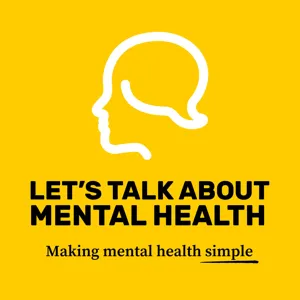Podcast Summary
A time of reckoning: Confronting dysfunctional patterns: The pandemic forces us to face internal work we've been avoiding, highlighting the importance of self-reflection and personal growth.
The current pandemic and resulting changes in our lives are acting as a mirror, reflecting the patterns and work we've been avoiding in ourselves and in society. This disruption is a time of reckoning, forcing us to confront the dysfunctional patterns we've been enduring. With fewer distractions and external structures, we're now more reliant on our internal resources, making it harder to ignore the work we need to do on ourselves. This change serves as a powerful reminder that the internal work we've been avoiding is still necessary, regardless of the external circumstances.
Amplifying emotional challenges, building resilience: Focus on inner emotional work for resilience, address underlying thoughts and patterns, prepare for future challenges
The current pandemic situation has amplified existing issues in our lives, making it a painful experience. However, it also presents an opportunity for us to focus on building emotional resilience by managing our minds and learning to handle both positive and negative emotions. Escapist behaviors may provide temporary relief, but true emotional resilience comes from confronting and addressing the underlying thoughts, patterns, and belief systems that cause distress. With many external circumstances beyond our control, this is an opportunity to focus on our inner emotional work. Through thought work and practicing emotional resilience, we can better prepare ourselves to navigate the challenges of the present and future. The coaching sessions you'll hear in this episode exemplify this process, and you'll likely see yourself in the experiences of those being coached. Ultimately, this is an opportunity to gain a deeper understanding of our own emotional processes and emerge from this experience stronger and more empowered.
Reflecting on our lives with intention: During uncertain times, reflect on actions, relationships, and mental health to live intentionally and consciously. Recognize unique circumstances but focus on thought patterns for growth.
During times of uncertainty and change, it's essential to reflect on our lives and consider if we're truly living with intention and consciousness. This can be a messy and chaotic process, but it's an opportunity for growth. The speaker emphasizes the importance of grappling with questions about our actions, relationships, and mental health during this time. In the coaching sessions mentioned, they cover various topics such as living with uncontrollable people, procrastination, health anxiety, and more. The key is to recognize that everyone's circumstances are unique, but the thought patterns are what truly matter. The speaker encourages listeners to join their community, "Unfuck Your Brain," for additional resources and support. Ultimately, the question to ask ourselves is, "What is my best life?" and how we can make choices that align with that vision, even in challenging circumstances.
Perception of best life can limit us: Recognize that current situation can be part of best life, focus on controllable aspects, and find meaning in present moment.
Our perception of what constitutes our "best life" can limit us if it's based on an idealized version that doesn't align with our current reality. Instead, it's essential to recognize that our current situation can be a part of our best life, even if certain aspects aren't ideal. We have the power to decide what our best life looks like and focus on the aspects we can control, rather than dwelling on what we can't change. It's important to remember that our thoughts and beliefs shape our reality, and believing that our current circumstances are incompatible with our best life can be unhelpful and even detrimental. Instead, we should strive to find meaning and fulfillment in the present moment, even if it doesn't perfectly align with our idealized vision.
Choosing to believe you're living your best life despite circumstances: Believe living your best life is subjective and within control, focus on growth and opportunities, and question limiting beliefs.
The perception of living your best life is subjective and within your control, regardless of external circumstances. The idea of a "best life" is a construct we create in our minds, and it's essential to challenge limiting beliefs and reframe our perspective. Instead of focusing on what we cannot change, we should focus on the growth and opportunities that exist within our current situation. For instance, during a pandemic with an alcoholic spouse, one could choose to view it as an opportunity for emotional work, connection, and learning. By deciding to believe that we are living our best life, we can gain a newfound appreciation for the present moment and potentially uncover hidden strengths and insights. It's crucial to question the underlying reasons for wanting to resist the idea of living our best life with certain circumstances, and to be curious about our thoughts and emotions. Ultimately, the power to decide and believe that we are living our best life lies within us.
Understanding and managing intrusive thoughts: Acknowledging and accepting intrusive thoughts as a normal part of the human experience, practicing self-compassion, and limiting exposure to stressors can help reduce their power and impact on emotional well-being.
Anxiety and intrusive thoughts, such as fearing the sudden death of a loved one, are common experiences that can feel overwhelming. However, trying to ignore or suppress these thoughts can actually make them more persistent. Instead, acknowledging that these thoughts are a normal part of the human experience, and practicing acceptance and self-compassion, can help reduce their power and impact on our emotional well-being. It's important to remember that our brains are wired to protect us, and while they may sometimes generate distressing thoughts, we don't have to join in the anxiety. Additionally, limiting exposure to sources of stress and negative information can help reduce the frequency and intensity of intrusive thoughts. Finally, knowing that others experience similar thoughts can provide a sense of comfort and normalcy.
Practice compassion towards your own mind: Acknowledge negative thoughts, validate feelings, but don't get lost in them. Practice compassion towards yourself to reduce intensity of reactions.
Just as we parent our children by acknowledging their emotions and offering compassion, we can also practice the same approach with our own minds during moments of distress. When we find ourselves fixated on negative thoughts, instead of getting swept up in the emotions and reacting with fear or frustration, we can hold a compassionate space for ourselves. This means acknowledging our feelings, recognizing that they are valid, but not getting lost in them. By practicing this skill, we can help ourselves move through difficult emotions and reduce the intensity of our reactions. It's important to remember that our thoughts, while real to us, may not accurately reflect reality, and that with time and practice, we can learn to approach our minds with the same patience and compassion we offer to our children.
Practice observing thoughts with compassion: Observe negative emotions with compassion instead of resisting or fully believing them, allowing for productivity and decreased intensity over time.
Instead of getting trapped in the cycle of resisting or fully believing our thoughts, we can practice observing them with compassion and understanding, just like we would with a child. This middle ground approach allows us to acknowledge our emotions without letting them take over and control our actions. It's important to remember that negative emotions are a normal part of being human, and trying to get rid of them completely is an unrealistic goal. As we continue to practice this skill, we may find that the intensity and duration of these emotions decrease over time. It's essential to recognize that our brains are wired to have thoughts and worries, especially during challenging times like quarantine, but we don't have to let them control our productivity.
Struggling with Productivity: The Impact of Negative Thought Patterns: Recognize and challenge negative thought patterns, focus on progress, and take consistent action towards goals to break free from the cycle of procrastination and achieve desired outcomes.
Our thoughts and beliefs, especially during times of stress or uncertainty, can significantly impact our actions and motivation. The speaker in this conversation shares her struggles with productivity and completing her schoolwork, which she attributes to her perfectionist tendencies and negative thought patterns. She admits to giving up on tasks when she feels overwhelmed and believing that her efforts are insufficient, leading her to repeat the same cycle of procrastination. The conversation highlights the importance of recognizing and challenging these negative thought patterns and taking consistent action towards goals, even if it's not perfect. It's essential to acknowledge and own our imperfections and understand that perfection is an unattainable standard. By focusing on progress and taking small steps towards our goals, we can break free from the cycle of procrastination and achieve our desired outcomes.
Breaking the cycle of perfectionism: Learn to be okay with doing a 'B-minus' job and focus on progress, not perfection. Remember, doing something is better than doing nothing.
Perfectionism often leads to an all-or-nothing mindset, where we believe that everything must be perfect or we're a failure. This thinking pattern can prevent us from making progress and being kind to ourselves. Perfectionists often spend more time planning and dreaming about perfection than actually doing the work. To break this cycle, it's important to learn to be okay with doing a "B-minus" job and focusing on progress, not perfection. Additionally, the belief that only those who do a lot are successful is a common misconception. The biggest difference is between those who do nothing and those who do something, no matter how small. Listening to podcasts that challenge perfectionist thinking, such as those on the concept of perfectionist fantasies and the infinite 1%, can be helpful in breaking free from this mindset.
Small consistent actions lead to exponential results: Focus on small daily improvements instead of striving for perfection to achieve significant results over time
Small consistent actions, even if they seem insignificant, can have exponential effects over time, much like compound interest. Perfectionism often hinders us from taking these small steps, leading us to believe that we need to wait until we reach a certain level before making progress. However, this mindset can prevent us from starting and building upon our efforts. The book "The Slight Edge" emphasizes this concept, using the analogy of compound interest to illustrate how small daily improvements can lead to significant results. Instead of striving for perfection, focus on taking small steps each day towards your goal. This approach is not only more achievable but also sets the foundation for continuous growth.
Impact of negative self-talk on mental health: Seek help to break the cycle of harsh self-talk and join a supportive community like The Clutch for personalized guidance and resources to improve mental health.
Self-criticism and negative thought patterns can significantly impact mental health. The speaker shares her personal experience with this issue and encourages others who may be struggling with similar thoughts to seek help. She emphasizes the importance of learning how to stop the cycle of harsh self-talk and offers a solution through her coaching community, The Clutch, where individuals can receive personalized guidance and connect with others going through the same process. The Clutch provides access to additional coaching tools and resources not shared on the podcast to help members deepen their understanding and application of thought work. The community aims to create a supportive environment where individuals can learn, grow, and blow their own minds. To join, listeners can visit www.unfuckyourbrain.com/forward/theclutch or text their email address to 347-934-8861 for more information.



